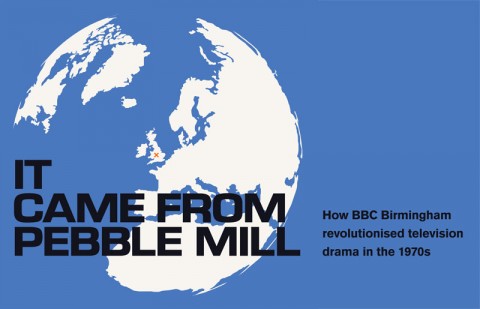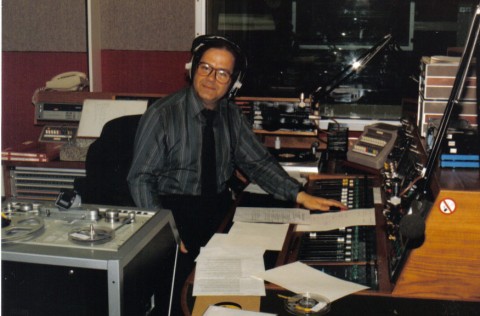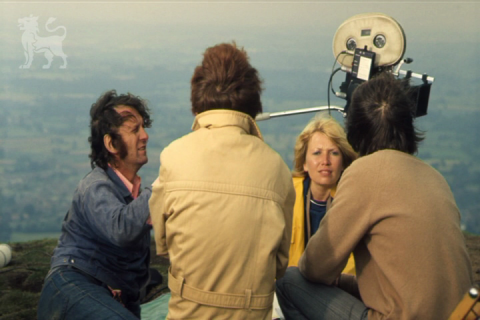 Long before shows like The Wire and The Sopranos ripped up the television rule-book, a corridor of the BBC’s Birmingham studio was rivalling HBO in the range and riskiness of its output. Over the course of a decade from 1972 onwards the unpromisingly-named English Regions Drama department created a unique culture where young writers and directors could flourish, where sci-fi and cop-show were taken in strange new directions, and where contemporary Britain in all its glory and messiness was reflected on the small screen. Last month the UK was represented at the Cannes Film Festival by Mike Leigh and Stephen Frears, two acclaimed filmmakers who developed their craft on that very corridor. It Came From Pebble Mill offers a rare opportunity to rediscover some of the best work from that period and to find out how those who made it got away with it.
Long before shows like The Wire and The Sopranos ripped up the television rule-book, a corridor of the BBC’s Birmingham studio was rivalling HBO in the range and riskiness of its output. Over the course of a decade from 1972 onwards the unpromisingly-named English Regions Drama department created a unique culture where young writers and directors could flourish, where sci-fi and cop-show were taken in strange new directions, and where contemporary Britain in all its glory and messiness was reflected on the small screen. Last month the UK was represented at the Cannes Film Festival by Mike Leigh and Stephen Frears, two acclaimed filmmakers who developed their craft on that very corridor. It Came From Pebble Mill offers a rare opportunity to rediscover some of the best work from that period and to find out how those who made it got away with it.
Highlights include:
Licking Hitler – David Hare’s first film, about a World War 2 propaganda unit
Nuts in May – cult Mike Leigh comedy about class warfare on the campsite
Empire Road – Britain’s first (and last) black soap opera, set in Handsworth
The Muscle Market – a precursor to Boys From the Blackstuff, starring Pete Postlethwaite and Alison Steadman
Gangsters – The French Connection comes to Spaghetti Junction
Plus landmark films from writers including Ian McEwan, Alan Plater and David Rudkin, and the half-hour play which featured British television’s first lesbian kiss.
Just like HBO, the department built its reputation by allowing writers to experiment. Having scored a hit in the 60s with police series Z Cars, producer David Rose established an environment with as little interference as possible from London. Cast and crew were all based in Birmingham during rehearsals and shooting, and in smoky corners of the BBC social club ideas were thrown around and new alliances were forged. Often shooting film on location – as opposed to the video-shot studio drama which dominated at the time – Pebble Mill produced gritty realism but also surreal comedy, sharp satire and the enduring poetic visions of films like Penda’s Fen and Red Shift.
Remarkably enough Rose went on to repeat this feat in the 1980s at Film Four, and recently his achievements were recognised with a Fellowship of the British Film Institute. Along with many of his colleagues from that time David Rose will be returning to Birmingham for this very special weekend of screenings and discussions at the newly refurbished mac, just around the corner from where Pebble Mill once stood.
Dates:
Friday 2 – Sunday 4 July, 2010
Venue:
Mac, Cannon Hill Park. Edgbaston, Birmingham B12 9QH
Booking:
Call 0121 446 3232, or buy online at www.macarts.co.uk.
Full programme information also available at www.7inch.org.uk.
It Came From Pebble Mill is presented by Birmingham City University and 7 Inch Cinema, with support from the National Lottery through ScreenWM. Additional support provided by the BBC, British Film Institute and Aquila TV.
www.macarts.co.uk
www.7inch.org.uk
www.bcu.ac.uk
 Shakespeare or Bust by Peter Terson, directed by lovely Brian Parker
Shakespeare or Bust by Peter Terson, directed by lovely Brian Parker

 Long before shows like The Wire and The Sopranos ripped up the television rule-book, a corridor of the BBC’s Birmingham studio was rivalling HBO in the range and riskiness of its output. Over the course of a decade from 1972 onwards the unpromisingly-named English Regions Drama department created a unique culture where young writers and directors could flourish, where sci-fi and cop-show were taken in strange new directions, and where contemporary Britain in all its glory and messiness was reflected on the small screen. Last month the UK was represented at the Cannes Film Festival by Mike Leigh and Stephen Frears, two acclaimed filmmakers who developed their craft on that very corridor. It Came From Pebble Mill offers a rare opportunity to rediscover some of the best work from that period and to find out how those who made it got away with it.
Long before shows like The Wire and The Sopranos ripped up the television rule-book, a corridor of the BBC’s Birmingham studio was rivalling HBO in the range and riskiness of its output. Over the course of a decade from 1972 onwards the unpromisingly-named English Regions Drama department created a unique culture where young writers and directors could flourish, where sci-fi and cop-show were taken in strange new directions, and where contemporary Britain in all its glory and messiness was reflected on the small screen. Last month the UK was represented at the Cannes Film Festival by Mike Leigh and Stephen Frears, two acclaimed filmmakers who developed their craft on that very corridor. It Came From Pebble Mill offers a rare opportunity to rediscover some of the best work from that period and to find out how those who made it got away with it.